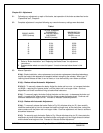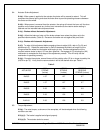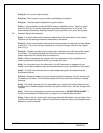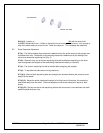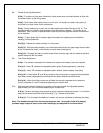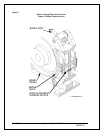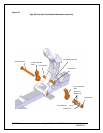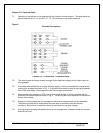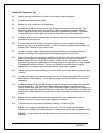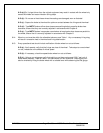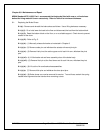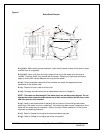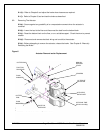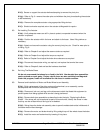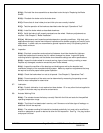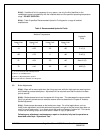
Chapter 8.0: Operational Test
8.1: Heed all warnings and cautions in addition to the owners’ safety procedures.
8.2: Follow all standards and local statutes.
8.3: Remove any drum chocks on a hoist application.
8.4: As a preliminary test of the brake without load, energize the actuator for one short jog. If the
brake fails to stop and hold the motion stationary, repair or re-adjust the brake as necessary.
Visually inspect the brake during operation to ensure all adjustments are correct. If successful,
continue with longer duration jogs until confident that the brake is operating satisfactorily.
8.5: A minimum of 60% contact between lining and wheel on each shoe is required before subjecting
the brake to its rated capacity.
8.6: If re-lined shoes have been fitted, or the brake alignment has been altered or is otherwise
suspect, you may have to realign the brake. This will minimize the bedding needed to obtain the
necessary 60% of brake lining to wheel contact.
8.7: The required lining contact is seldom achieved without “bedding”, but time spent to achieve
satisfactory bedding will be rewarded with a considerably longer life for the lining.
8.8: Modern linings, although hard wearing, are difficult to “bed” when the area in contact with the
wheel cannot support the heat energy transferred to the brake. As a result the linings will
become “glazed” where in contact with the wheel. “Glazing” is the name applied to a condition
where the lining has been heated beyond its working temperature range and is no longer capable
of its designed coefficient of friction. “Glazing” will seldom be removed by further braking
operations as any increase in area of lining contact will immediately be glazed.
8.9: “Glazing” can be prevented by ensuring a minimum of 60% contact area before placing the brake
in service.
8.10: On hoists, well spaced, short bursts of energy, such as an E.Stop at high speed with no load are
best to achieve initial “bedding”. This will limit the energy input while the wheel is monitored for
temperature.
8.11: A distinct advantage of the type MST/E brakes is that the actuator can be easily overridden while
the drive is operating. This can be accomplished with a short length of pipe fitted over the
“manual release lever extension”, Fig. 1. When circumstances permit, pressure can be applied to
force the shoes against the wheel while the drive is operating. Care must be taken to achieve the
minimum 60% contact between lining and wheel on each shoe, without exceeding the maximum
of 150°C.
8.12: Bedding is just as important when the brake is applied with a four quadrant drive, and not
subjected to dynamic loading, except under emergency conditions.
8.13: The following are the key steps to satisfactory “bedding” to extend lining life.
8.13.(a): Use only genuine Mondel lined brake shoes. This will maintain specified brake
performance and ensure that the braking torque is neither more nor less than the specified rating.
8.13.(a).(i): Linings thicker than the original equipment may result in contact with the wheel only
at the tips.
8/17/2006 Page 24 of 33 MST/E Electric Shoe Brakes Manual
560022-R6



